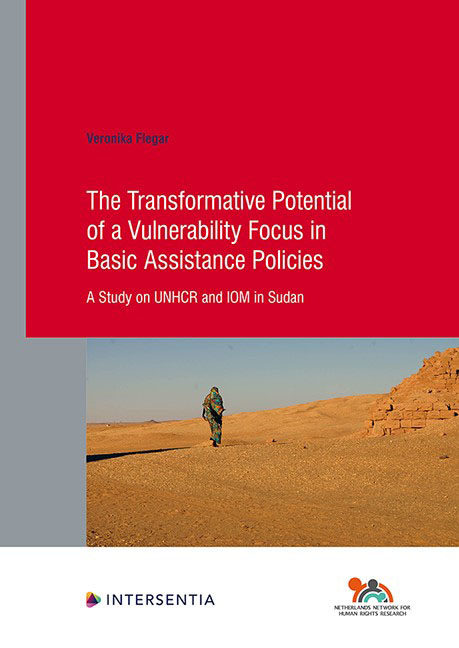 The Transformative Potential of a Vulnerability Focus in Basic Assistance Policies
The Transformative Potential of a Vulnerability Focus in Basic Assistance Policies Book contents
- Frontmatter
- Dedication
- Preface and Acknowledgements
- Contents
- List of Abbreviations
- List of Tables
- List of Figures
- Chapter 1 Introduction
- PART I NORMATIVE AND EMPIRICAL THEORY
- PART II BACKGROUND TO THE CASE STUDIES
- PART III CASE 1: ASSESSING AND ADDRESSING VULNERABILITY AT UNHCR KHARTOUM
- PART IV CASE 2: ASSESSING AND ADDRESSING VULNERABILITY AT IOM KHARTOUM
- PART V
- Bibliography
- Samenvatting
- Summary
- About the Author
- Human Rights Research Series
Chapter 1 - Introduction
Published online by Cambridge University Press: 11 November 2021
- Frontmatter
- Dedication
- Preface and Acknowledgements
- Contents
- List of Abbreviations
- List of Tables
- List of Figures
- Chapter 1 Introduction
- PART I NORMATIVE AND EMPIRICAL THEORY
- PART II BACKGROUND TO THE CASE STUDIES
- PART III CASE 1: ASSESSING AND ADDRESSING VULNERABILITY AT UNHCR KHARTOUM
- PART IV CASE 2: ASSESSING AND ADDRESSING VULNERABILITY AT IOM KHARTOUM
- PART V
- Bibliography
- Samenvatting
- Summary
- About the Author
- Human Rights Research Series
Summary
This study investigates the transformative potential of a vulnerability focus in basic assistance policies. It includes two case studies on such policies, both set in Khartoum, Sudan. The first case study focuses on the United Nations High Commissioner for Refugees (UNHCR) while the second case study centres on the International Organisation for Migration (IOM). The analysis concentrates on basic assistance providers, i.e. on the case workers and their direct superiors who design and implement the respective basic assistance policies.
This opening chapter outlines the research topic and approach of this study. It starts with an overview of the relevance and focus of this research (1.1 – 1.3). Subsequently, the chapter explains the study's embeddedness in the sociology of human rights (1.4) and its epistemological standpoint of critical pragmatism (1.5). The chapter then proceeds to present the research approach (1.6) and ends with a section on key terminology choices (1.7) and an overview of the structure of the book (1.8).
THE INCREASED FOCUS ON, BUT DISPUTABLE VALUE OF, VULNERABILITY
‘Vulnerability’ seems to have become a buzz-word in law and policy and some even speak of “[a] vulnerability zeitgeist”. The term serves as a tool for understanding and addressing social problems and “now stretches into so many governance areas it is difficult to keep track, permeating policy matters ranging from violence against women to volcanoes”. Despite – or perhaps because of – this multifaceted use, vulnerability is not a clear-cut or neutral concept. Rather, the notion of vulnerability brings with it a variety of different connotations and dilemmas that often remain obscured. This obscurity around the notion's content, choices and context raises the question whether and to what extent the increased attention to vulnerability is desirable from a human rights perspective: does a vulnerability focus ensure or endanger the realisation of universal human rights? Previous authors appear to be somewhat divided on this issue.
Proponents of increased attention to vulnerability are generally inclined to view the notion as beneficial for the realisation of universal human rights. They argue that, by focusing on humans as embodied and socially embedded, the vulnerability notion emphasises the ‘human’, rather than the ‘rights’, element of the human rights paradigm.
- Type
- Chapter
- Information
- The Transformative Potential of a Vulnerability Focus in Basic Assistance PoliciesA Study on UNHCR and IOM in Sudan, pp. 1 - 22Publisher: IntersentiaPrint publication year: 2020


